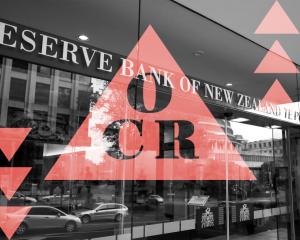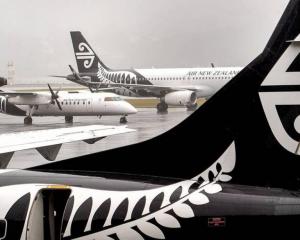Core Crown tax revenue for the eight months ended February increased $1.9 billion, or 5%, compared to the same time last year, acting chief government accountant Fergus Welsh said.
However, that was $1.1 billion less than expected and was reflected across most tax types, continuing the pattern of recent months.
The lower than forecast tax relating to corporate tax ($372 million) and source deductions ($136 million) was thought to be mostly due to timing issues, he said.
Overall, it was expected that slightly more than half of the $1.1 billion weaker year-to-date result would remain at year end once the elements that appeared timing-related reversed.
''There are risks associated with this view and, owing to the timing of tax assessments, much of the expected narrowing may not be apparent until June data is received," Mr Welsh said.
Updated tax revenue forecasts would be announced in the May Budget 2014, he said.
It was anticipated a stronger outlook for the economy would further boost tax revenue, resulting in an outlook for tax revenue for 2014-15 broadly similar to the one presented in the fiscal update.
As a result, tax revenue developments were not likely to impact on the forecast surplus for the 2014-15 year.
Deloitte Dunedin tax partner Peter Truman said the shortfall in budget tax revenue across the board suggested the economic recovery had been at a lower level than originally forecast by Treasury.
However, it would be expected there would be a delay between a pick-up in activity and company income tax being collected.
Due to annual tax returns being filed - and those were sometimes filed up to 12 months after the year of each financial year - there could be a big delay in company tax collections flowing through, he said.
''The relatively high 'use of money' interest rates charged by IRD on provisional tax payments, where these are less than the year end liability, act as disincentive for larger businesses to defer paying provisional tax.
''I would expect PAYE and GST would respond more quickly to an increase in economic activity, with higher employment rates resulting in an increased PAYE take flowing to IRD within a month or so.''
While there were some sectors of the economy where there were signs of momentum in activity levels, there were other sectors of the economy that continued to struggle due to the high exchange rate, such as manufactured exports, Mr Truman said.
The books showed the Government's measure of the surplus and deficit, the operating balance excluding gains and losses (obegal) was a $1.4 billion deficit, compared to a forecast deficit of $509 million. At the same time last year, the obegal was a deficit of $3 billion.
The operating balance, which takes account of the gains from Crown investments, was a surplus of $3.7 billion compared to a forecast of $2.8 billion.
At the same time last year, the operating balance was a surplus of $4.3 billion.
Continued strength in equity markets saw a gain of $3.5 billion recorded on the investments held by the Government Superannuation Fund and ACC, $1.9 billion ahead of forecast.
Finance Minister Bill English continued his refrain from last month in warning the Crown accounts showed there was no room for an election year spend-up.
''Another month of revenue running below forecast has again pushed up the deficit and reinforces the need for restraint in government spending.
''We remain committed to reaching surplus next year and Budget forecasts next month will confirm we are on track. But today's figures confirm what we have said repeatedly: it is a challenging task that will be achieved only if we remain disciplined.''
Commenting on the tax position, Mr English said while some of the variance was due to timing issues, and was likely to dissipate over coming months, corporate tax, GST, other individual tax, source deductions and customs and excise duties were all below forecast.
Those figures would be factored into next month's Budget and reinforced the need for restraint in government spending.
''They also confirm there will be no capacity for reckless spending promises ahead of the election later this year,'' he said.
Labour finance spokesman David Parker said National's excuses were wearing thin.
If wages were rising, the tax take would be increasing.
''This is plainly not happening and hard-working New Zealanders are not getting their fair share. Serious questions need to be asked of National's economic management.''
In November, December, January and now February, the Crown accounts were worse then predicted.
For the November and December figures, Treasury said there were timing issues.
They were given a bit of leeway.
''But now, even Treasury admits it doesn't know why the books are even more in the red. Somehow, Bill English is presiding over a growing economy but not getting the tax revenue that should be coming in. He needs to explain himself,'' Mr Parker said.












